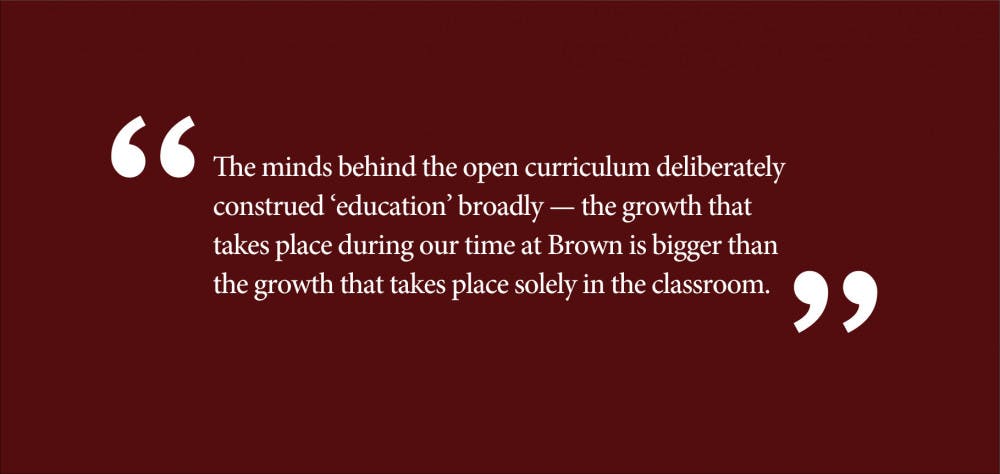I was surprised to read Aidan Calvelli’s ’19 opinion in last Friday’s Herald. This is not just because it seemed like a change of tune from his op-ed earlier this year — which praised the “exploratory, individualized and empowering” learning experiences that can arise when we are “freed from the shackles of grades” — but also because it seemed to lose sight of two ideas that are central to the open curriculum. First, the de-emphasis on grades, and second, the more fundamental notion that it is up to us to make choices about how to spend our time at Brown.
There is an entire chapter of the Magaziner-Maxwell Report — the foundational text of Brown’s open curriculum — that grapples with the many and varied problems that arise out of the grading process. Grades evaluate a narrow set of skills which may or may not capture what a student has gained from the course. They have a tendency to measure solely the retention of material (some might regard this as scholastic achievement, others may not) rather than broader conceptual fluency or improved critical thinking. Moreover, a professor teaching one section of a course might value the development of different skills than a professor teaching another section of the same course, such that the same student might get an A if they were enrolled in one section but a B if they were enrolled in the other — further demonstrating how grades fail to represent the idealized notion of academic growth.
The report concludes that there is “doubt as to what grades measure and as to the reliability of this measurement.” Stricter grading isn’t a meaningful tool for producing the kinds of behavioral change Calvelli hopes to see. Rather, it amplifies the ways in which grading is a largely imperfect endeavor. If anything, it seems to me that stricter grading would incentivize the mindless “grade-getting” behavior that the authors of the Magaziner-Maxwell Report decry.
Brown is a school with a remarkable concentration of skilled readers, writers and thinkers. It is disingenuous to suggest that academic expectations at Brown are low because students have time to watch TV and participate in clubs. There is a difference between rigor and onerousness — we ought not make things harder for harder’s sake. In fact, the Magaziner-Maxwell Report warns against the University placing “excess demand on the student’s time” precisely because the process of self-realization requires time to contemplate oneself and one’s choices — the very kind of contemplation Calvelli calls for. Our academic lives are a single piece of the larger puzzle of a Brown education, and that’s the way it ought to be.
This brings me to the bigger underlying problem with Calvelli’s thesis. It is our job as participants in the open curriculum to make our own choices about how we move through this university. Chapter nine of the Magaziner-Maxwell Report argues that Brown should be an “environment in which students are encouraged to formulate and consider the problems which are most basic to them — what their lives are about, why they seek the goals they do, where they want to go and what they want to do.” Each Brown student is a bit different, and so each of us chooses to take a slightly different path during our time here. That’s part of what makes this place special.
Some students choose to take on extracurricular leadership roles, seek out avenues for creative expression or pursue community engagement opportunities. Some students arrive on campus with choices that are constrained by factors outside of their control and find themselves working multiple jobs to send money back home to loved ones. Some students juggle health problems alongside their academic and extracurricular pursuits. Some students are striving to figure out how to balance all of these things and still have time to kick back and watch Game of Thrones at the end of the day.
The minds behind the open curriculum deliberately construed “education” broadly — the growth that takes place during our time at Brown is bigger than the growth that takes place solely in the classroom. Again, the document speaks for itself: “Those people who think that intellects develop in proportion to the number of hours in a class, or the number of books read, … (have) failed to realize what the development of intellect means.” We become educated not only by reviewing notes and editing papers, but also by building community, solving real-world problems and learning how to decide for ourselves what is valuable. But of course, the beauty of the open curriculum is its flexibility. If a student feels that academic learning ought to be the biggest part of their college experience, they can rest easy knowing there is no shortage of additional responsibility on this campus for them to undertake.
Ruth Foster ’19 reads the Magaziner-Maxwell report for fun. She can be reached at ruth_foster@brown.edu. Please send responses to this opinion to letters@browndailyherald.com and op-eds to opinions@browndailyherald.com.





